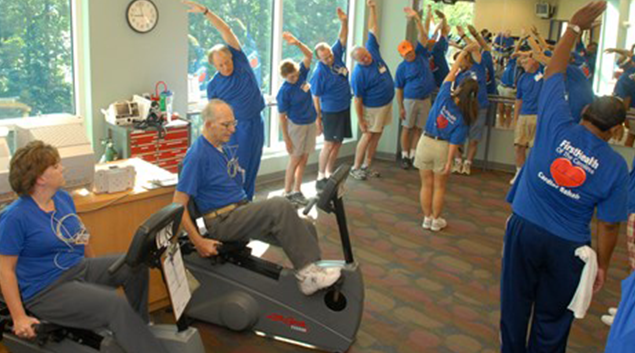Introduction
When it comes to heart health, knowledge is power. Heart diseases are some of the leading causes of mortality worldwide, and the importance of taking proactive steps for recovery cannot be overstated. That's where cardiac rehabilitation comes into play. At IMC Hospital, we provide comprehensive cardiac rehabilitation programs tailored to each patient's unique needs. This article will delve into the essential elements of cardiac rehabilitation, the specific processes at IMC Hospital, and the transformative benefits for patients.
What is Cardiac Rehabilitation?
Cardiac rehabilitation is a medically supervised program designed to improve cardiovascular health and help patients recover after heart-related issues. It typically involves a combination of exercise training, education on heart-healthy living, and counseling to reduce stress and improve mental health. The goal is to aid patients in regaining their strength and adopting a healthier lifestyle.
Who Needs Cardiac Rehabilitation?
Cardiac rehabilitation is beneficial for a wide array of patients. It is typically recommended for individuals recovering from:
· Heart attacks
· Heart surgery (like bypass or valve replacement)
· Angina (chest pain)
· Heart failure
· Other cardiovascular conditions
Benefits of Cardiac Rehabilitation
The benefits of cardiac rehabilitation extend beyond just physical recovery. Patients often experience:
· Physical Benefits: Increased strength and stamina, improved heart function, and better overall health.
· Emotional and Psychological Benefits: Enhanced mental well-being, reduced anxiety, and increased confidence in managing their health.
The Cardiac Rehabilitation Process at IMC Hospital
At IMC Hospital, our cardiac rehabilitation process begins with a thorough assessment. We consider the patient's medical history, current health status, and personal goals to create a customized treatment plan that addresses their unique needs.
Phases of Cardiac Rehabilitation
Phase I: Inpatient Rehabilitation
During this initial phase, patients are closely monitored while engaging in light physical activity, education about heart health, and counseling. The focus is on stabilizing the patient’s condition and preparing them for the next phase.
Phase II: Outpatient Rehabilitation
Once discharged, patients transition to outpatient rehab. Here, they participate in structured exercise programs designed to improve cardiovascular fitness. Patients benefit from continuous monitoring and support as they gradually increase their activity levels.
Phase III: Maintenance and Support
The final phase is about sustaining the gains made during rehabilitation. Patients receive long-term wellness strategies, ongoing support, and access to support groups to maintain their heart health.
Modern Technology in Cardiac Rehabilitation
At IMC Hospital, we embrace modern technology to enhance patient care. Our use of telehealth services allows patients to engage with their rehabilitation programs from the comfort of their homes. Furthermore, innovative monitoring technologies ensure that healthcare providers can track progress in real-time, enabling timely interventions when necessary.
Exercise Programs in Cardiac Rehabilitation
Exercise is a cornerstone of cardiac rehabilitation. Our programs include a variety of exercises tailored to patients' abilities, focusing on aerobic fitness, strength training, and flexibility. These exercises help improve cardiovascular health, enhance functional capacity, and promote overall well-being.
Nutrition and Lifestyle Modifications
Diet plays a crucial role in heart health. Our registered dietitians provide personalized dietary recommendations, emphasizing heart-healthy foods and sustainable lifestyle changes. Patients learn how to make informed food choices that support their recovery and long-term health.
Patient Success Stories at IMC Hospital
One of the most rewarding aspects of our cardiac rehabilitation program is witnessing the success stories of our patients. Many have shared how the program not only improved their physical health but also transformed their lives. For instance, a patient named Ali, who struggled with post-surgery anxiety, found renewed strength and confidence through our support and exercise programs.
Conclusion
Cardiac rehabilitation is a vital step in recovering from heart-related issues and improving overall health. At IMC Hospital, we are committed to providing comprehensive and personalized care to help our patients thrive. If you or a loved one is facing heart health challenges, don't hesitate to seek the help you need to embark on a path to recovery.
FAQs
What is the typical duration of a cardiac rehabilitation program?
The duration can vary but typically lasts 12 weeks, with sessions several times a week.
Is cardiac rehabilitation covered by insurance?
Most insurance plans cover cardiac rehabilitation, but it's best to check with your provider for specifics.
Can I participate in cardiac rehabilitation if I have other health conditions?
Yes, many patients with other health conditions can still benefit from cardiac rehab. A personalized program can be designed to accommodate these needs.
How can family members support someone in cardiac rehabilitation?
Family members can provide emotional support, encourage participation in the program, and help with lifestyle changes at home.
What happens if I miss a session?
It's essential to communicate with your healthcare provider about missed sessions, as they can help you make a plan to catch up or adjust your program accordingly.





Comments